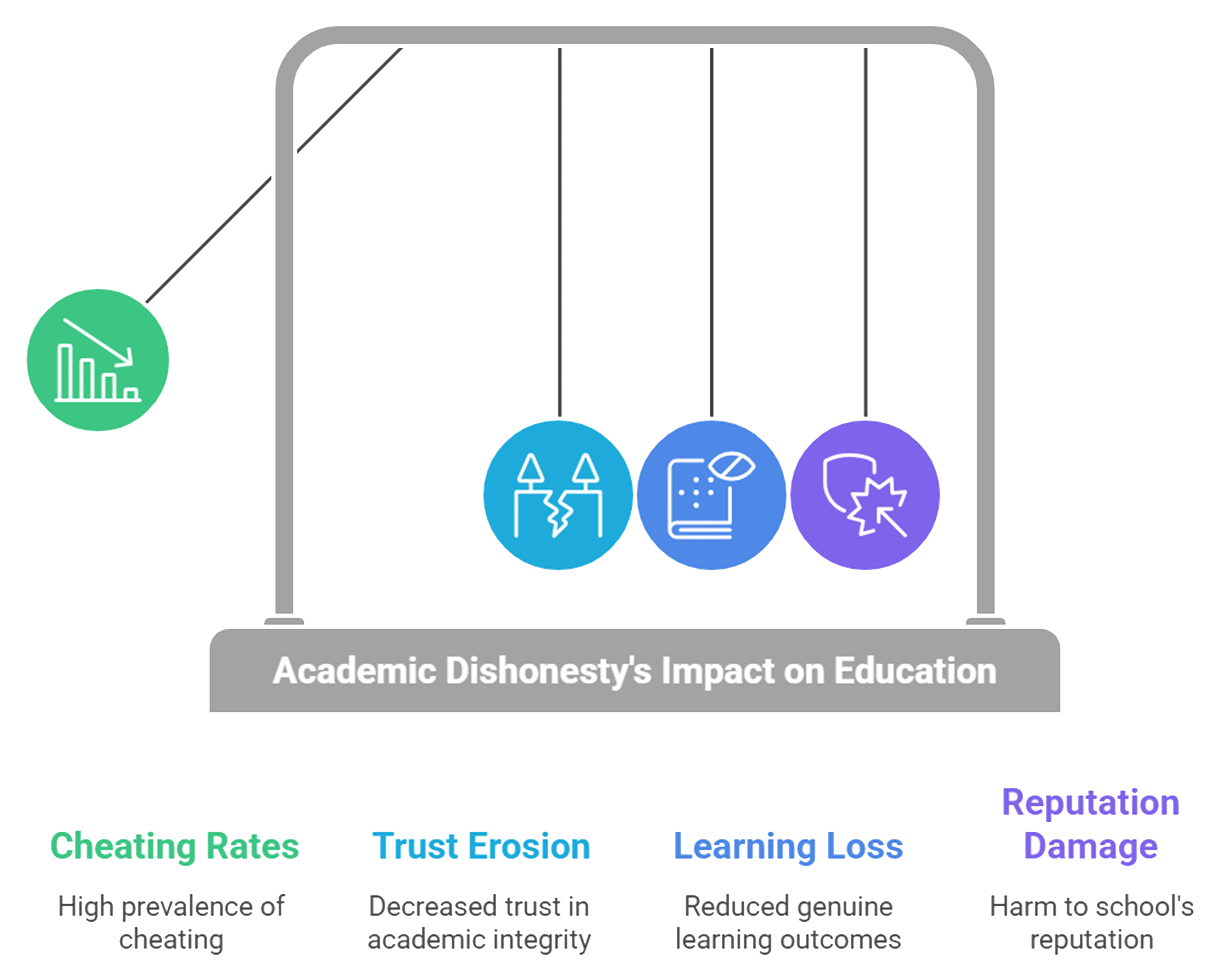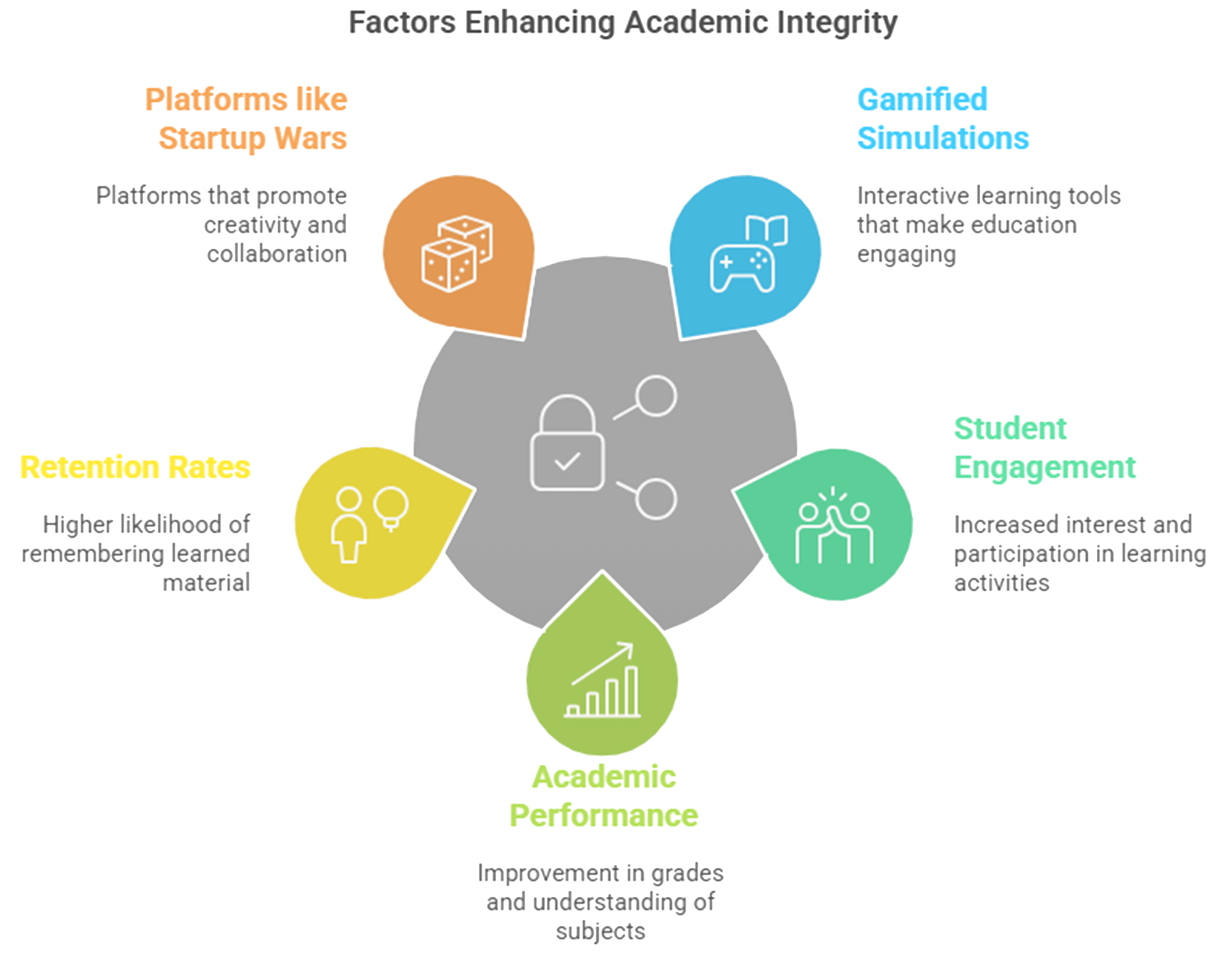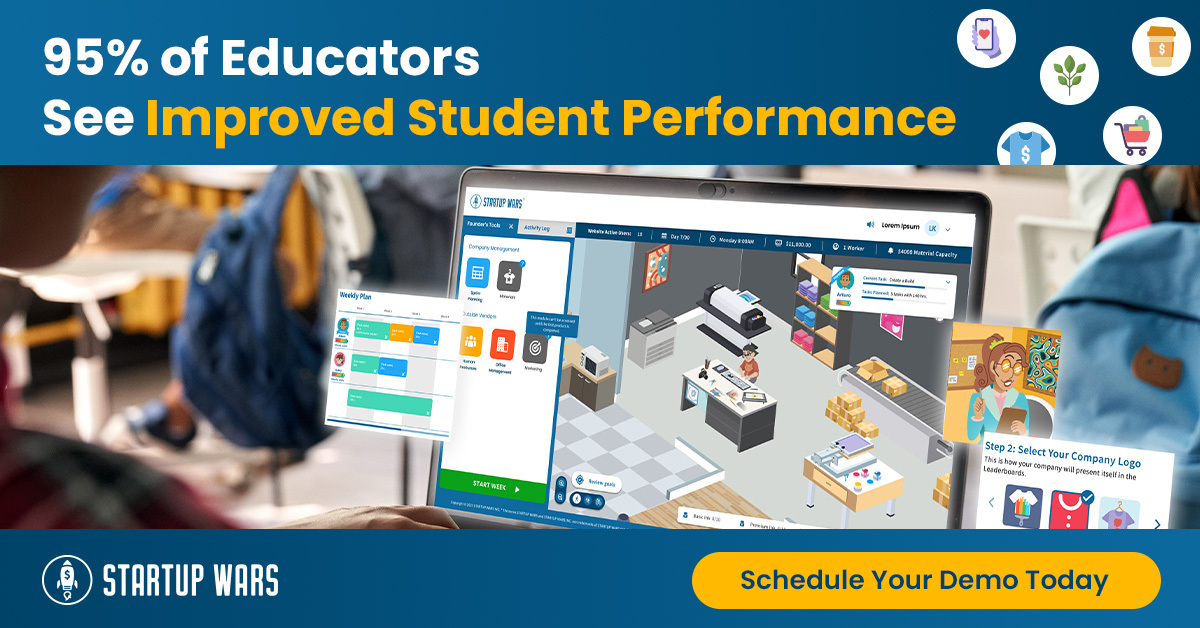Discover practical strategies to prevent cheating in schools and innovative tools, like gamified simulations, to enhance academic integrity, engage high school students, and create a classroom environment where cheating is no longer a challenge.
Table of Contents
The Problem: Cheating in High Schools
Cheating in schools, particularly in high school classrooms is an issue that not only disrupts the learning process but also sets a dangerous precedent for future behaviors.

How Common is Cheating in High Schools?
Studies reveal that over 58% of high school students admit to cheating on tests, while a staggering 95% confess to engaging in some form of academic dishonesty during their school years. This prevalence reflects how normalized cheating has become in many school environments, making it an urgent issue for educators to address.
Why Do High School Students Cheat?
Students may resort to various cheating methods, such as using technology or copying assignments, as part of common ways of cheating in school.
- Technological Accessibility: Devices like smartphones and laptops have made it easier than ever for high school students to access unauthorized information during tests.
- Peer Pressure and Social Influence: Many students cheat because they see their peers doing so without facing consequences. A 2016 study found that 62% of college students admitted to cheating, highlighting a pattern that often begins in high school.
- High Academic Stakes: Standardized tests and grade-based competition create pressure that drives some students toward dishonest methods.
- Ineffective Monitoring: Without consistent policies and oversight, opportunities to cheat become more frequent and tempting.
- This is what students say about cheating:
- “If the assignment was online, and there was no way I was going to pass on my own, you bet I cheated”
- “I did it bc I guess I thought I was stupid or something, I know now I didn’t have to. You live and learn, I guess.”
- Indeed I did. I was a lazy student with undiagnosed ADHD”
Consequences of Cheating in High School Education
When students cheat, it goes beyond poor classroom performance. It can:
- Undermine their learning experience: Students miss out on opportunities to genuinely engage with and master the material.
- Promote a lack of accountability: Repeated dishonesty can lead to a mindset where unethical behavior becomes acceptable.
- Devalue earned grades: When cheating is widespread, grades no longer reflect true achievement, harming academic credibility.
- Encourage lifelong unethical habits: Research shows that students who cheat in school are more likely to engage in dishonest practices in the workplace and other areas of life, so it is important for teachers to prepare students to learn from their mistakes.

Without robust plagiarism detection systems, academic dishonesty can devalue earned grades and harm a school’s reputation.
By understanding these causes and consequences, educators can take steps to address the issue effectively.
5 Ways to Prevent Cheating in High Schools

Cheating in high schools is a growing concern for educators, but by implementing the best practices for preventing cheating in the classroom, teachers can create a culture of academic integrity. This guide explores top strategies to reduce cheating in high school students, including the use of gamified simulations like Startup Wars, to promote honesty and active learning.
Encourage Academic Integrity in Schools with Clear Communication
Start by setting the stage for honesty in your classroom:
- Clarify Expectations: Clearly communicate what constitutes academic dishonesty, ensuring students understand the rules and consequences. An honor code signed by students can emphasize accountability.
- Reward Ethical Choices: Acknowledge and celebrate students who demonstrate honesty, encouraging peers to follow their lead.
- Lead by Example: Model integrity in your own actions, such as grading fairly and addressing mistakes transparently.
By establishing these principles, you create a culture where students feel encouraged to do the right thing.
Use Technology to Stop Cheating in High Schools
One of the biggest concerns for teachers today is the use of AI tools like ChatGPT during exams. With iPads and other devices available in classrooms, students can easily access these tools to generate answers, making it challenging to assess their true understanding. However, technology can be a teacher’s best ally in combating cheating, especially when paired with innovative tools like gamified simulations.
- Redesigning Assessments for Integrity: Use technology to shift from traditional exams to interactive, problem-solving assessments that encourage critical thinking. For instance, platforms like Startup Wars immerse students in real-world business scenarios. This hands-on approach not only teaches responsibility but also reduces opportunities for dishonesty, as each student’s decisions and outcomes are unique.
- Engage Through Gamification: A study shows that students participating in gamified courses showed a 42% improvement in academic performance and 130% higher retention rates than those in traditional classrooms. Platforms like Startup Wars take education to the next level by immersing students in real-world scenarios where critical thinking and creativity are rewarded.
- Startup Wars, for example, places students in the role of entrepreneurs, allowing them to build virtual businesses in a competitive but constructive environment. It’s not just fun, it’s an innovative way to teach responsibility and decision-making while reducing the temptation to cheat.

- Gamified Platforms Facilitate Engagement: gamified simulations like Startup Wars encourage accountability and academic integrity by making learning both fun and challenging. Unlike traditional exams, these platforms reward creativity, strategic thinking, and collaboration.
AI tools like ChatGPT have created new challenges in preventing academic dishonesty. Addressing AI and cheating requires innovative approaches, such as designing assignments that make cheating with AI tools difficult.
By integrating gamified simulations, you can replace stress-driven dishonesty with excitement and engagement.
Design Tests That Make Cheating Harder
Reevaluating how you measure student understanding can make a big difference:
- Focus on Practical Skills: Use project-based assessments that test students’ ability to apply what they’ve learned, rather than memorization, so they can develop the top 10 business skills needed to succeed.
- Group Challenges with Guardrails: Collaborative projects can foster teamwork and reduce individual cheating when roles and responsibilities are clearly defined.
- Gamified Alternatives: Gamified simulations like Startup Wars add a new dimension to learning. They challenge students to apply business concepts, strategize, and adapt in ways traditional tests cannot.
Not only do these approaches deter cheating, but they also prepare students for life beyond the classroom.
Build Trust and Motivate High School Students to Prevent Cheating
A supportive environment can transform a student’s mindset:
- Offer Support for Struggling Students: Cheating often stems from stress. Address this by offering flexibility, such as extended deadlines or extra help.
- Connect Lessons to Real-Life Success: When students see the relevance of their work—especially through gamified simulations like Startup Wars—they’re motivated to try their best.
- Provide Instant Feedback: Quick, actionable feedback helps students see progress and builds their confidence.
By engaging with students and understanding their struggles, you create a classroom where cheating becomes less appealing.
How Gamified Simulations Prevent Cheating in Classrooms
One of the most effective ways to combat cheating while boosting engagement is through gamified learning platforms. Over 80% of educators report that gamified simulations improve student engagement, making it less likely for students to rely on dishonest practices.
Startup Wars takes students on an entrepreneurial journey where they’ll build their own businesses, navigate challenges, and learn the value of critical thinking and perseverance. These simulations are more than just games—they’re immersive learning tools designed to:
- Teach responsibility and integrity in a competitive, hands-on-inspired environment.
- Motivate students with engaging, hands-on scenarios that make lessons stick.
- Encourage accountability by rewarding effort and decision-making.
- Can offer personalized assessments tailored to each student’s progress, reducing opportunities for academic dishonesty.
Why not take a step toward transforming your classroom today? See how Startup Wars can inspire honesty, creativity, and collaboration among your students.
How Technology and Gamified Simulations Can Prevent Cheating in High Schools

Gamified simulations are transforming education by providing immersive, hands-on learning experiences. For high school teachers looking to engage students more effectively, these tools represent a game-changing opportunity to blend fun and learning seamlessly.
Engage High School Students with Applied Learning Challenges
Gamified learning naturally motivates students by introducing elements of competition, rewards, and collaboration. In a recent article, we found that experiential learning, like simulations, improves retention rates by up to 85% compared to traditional methods.
With Startup Wars, students are immersed in building their virtual businesses, making every decision impactful. They see the immediate consequences of their actions, which reinforces lessons in budgeting, marketing, and leadership. Other platforms, such as Duolingo for language learning, demonstrate the power of gamification in keeping learners engaged over time.
These tools are helping students build the top 10 career-ready skills by simulating real-life challenges, such as managing a supply chain or creating a marketing strategy, fostering critical thinking and decision-making abilities.
Enhance High School Learning with Instant Feedback Tools
Feedback is essential to learning, and gamified simulations excel at providing it instantly. Platforms like Codecademy, which teaches coding, or Startup Wars deliver instant feedback on choices made during simulations. Students learn from their mistakes immediately, which helps them refine their strategies and grow more confident in their abilities.
For instance, in Startup Wars, if a student overspends their budget, the simulation shows the financial consequences, encouraging them to adjust their approach. This hands-on experience mirrors authentic challenges, creating a deeper understanding of business principles.
Using secure online testing platforms alongside gamified simulations ensures a robust anti-cheating framework.
Encourage Future-Ready Skills in High School Students
Gamified simulations help students develop essential 21st-century skills like critical thinking, collaboration, and adaptability. While platforms like SimCity EDU focus on urban planning and environmental issues, Startup Wars honest entrepreneurial abilities, empowering students to think like innovators. Study shows that 83.78% of students agreed gamification promotes motivation for learning, and 81.08% highlighted its role in fostering active participation and engagement.
These skills don’t just prepare students for exams, they prepare them for life. By engaging in scenarios that mimic the complexities of real-world industries, students gain the confidence to face professional challenges with creativity and resilience.
Why Startup Wars is a Game-Changer for Business Education to Prevent Cheating
Startup Wars isn’t just another educational tool, it’s a game-changing platform, a gamified simulation that transforms how business concepts are taught while addressing one of the biggest challenges in classrooms today: cheating. By immersing students in real-world scenarios, Startup Wars fosters academic integrity, critical thinking, and hands-on learning, making it nearly impossible for students to rely on shortcuts.
A World of Possibilities: Why Cheating is Nearly Impossible
In Startup Wars, students navigate complex business scenarios, making numerous interconnected decisions, each influencing the next. The outcomes grow exponentially with every choice, ensuring every simulation is unique and unpredictable so it is impossible to cheat.
Let’s break it down with an example:
- Suppose a simulation involves 100 decisions, and each decision has 3 possible choices, the total number of outcomes is:
3^100
This results in over 5.15 × 10⁴⁷ unique outcomes, an astronomical number that ensures every student’s experience is distinct.
Even in simpler scenarios:
- With 50 decisions and 4 choices per decision, the outcomes still reach:
4^50=1.27×10^30
This level of complexity guarantees that no two simulations are identical, meaning students must rely on their critical thinking and decision-making skills rather than shortcuts or pre-planned strategies.
A Teacher’s Best Ally in Preventing Cheating
For high school educators, Startup Wars provides a modern, effective solution to academic dishonesty:
- No Predictable Paths: With countless possible outcomes, there’s no “right” answer for students to memorize or share.
- Hands-On Engagement: Success requires active participation, making cheating irrelevant.
- Real-World Learning: By focusing on decision-making and critical thinking, Startup Wars ensures students are learning skills that matter beyond the classroom.
Curious about how Startup Wars can transform your classroom into a hub of academic integrity and engagement?
Frequently Asked Questions
1. How do I prevent cheating in schools?
2. What is Startup Wars, and how does it work in a classroom setting?
3. How can Startup Wars help prevent cheating in the classroom?
4. Do I need prior experience in business to use Startup Wars as a teacher?
5. How do I get started with Startup Wars?
Discover how Startup Wars can revolutionize your classroom and inspire your students.
Schedule a call with our team to know more.
Sources
- Academia. (n.d.). Detecting and preventing cheating in exams: Evidence from a field experiment. https://www.academia.edu/64827200/Detecting_and_Preventing_Cheating_in_Exams_Evidence_from_a_Field_Experiment
- ERIC. (2023). EJ1382877: Understanding academic dishonesty in online learning environments. https://files.eric.ed.gov/fulltext/EJ1382877.pdf
- Lampropoulos, G., & Sidiropoulos, A. (2024). Impact of gamification on students’ learning outcomes and academic performance: A longitudinal study comparing online, traditional, and gamified learning. Education Sciences, 14(4), 367. https://www.mdpi.com/2227-7102/14/4/367
- ERIC. (2023). EJ1412003: Exploring the role of teacher-student relationships in promoting academic integrity. https://files.eric.ed.gov/fulltext/EJ1412003.pdf
- Eureka Simulations. (n.d.). Immersing yourself in learning: The power of hands-on experience and simulations in education. https://www.eurekasimulations.com/blog/immersing-yourself-in-learning-the-power-of-hands-on-experience-and-simulations-in-education/
- Startup Wars. (2025). The state of entrepreneurship education 2025: Trends, challenges, and opportunities for high schools. https://www.startupwars.com/state-entrepreneurship-education-2025-trends-challenges-opportunities-high-schools/
People Also Searched For:
-
Key Finance and Accounting Concepts Students Learn From Startup Wars
-
How Startup Wars Uses The Main Principles Of Lean Canvas Methodology
-
Financial Management and What Students Can Learn From A Startup Simulation Game
-
Tips To Be Successful In A Startup Simulation
-
How Startup Wars Allows Students To Make Critical Business Decisions





